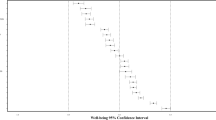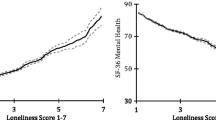Abstract
The impact of government structure on citizen welfare remains an open question. This study uses a repeated cross-section data (China General Social Survey) of Chinese urban households to test the hypothesis that fiscal decentralization increases individual welfare. The data used were collected in 2003, 2005 and 2006 and covered most of the provinces in China. We construct two measures of fiscal decentralization: one is based on revenue and the other on expenditure. Then we apply ordered Probit regression to investigate the impact of decentralization on individual life satisfaction after controlling a rich set of individual characteristics and several important macroeconomic factors. We find that greater revenue decentralization increases life satisfaction, a finding that is quite robust across different specifications. We also find that revenue decentralization is more important to the underdeveloped western region, the private sector employees and homeowners. In terms of income distribution, both the rich and the poor gain from revenue decentralization.
Similar content being viewed by others
References
Akai, N., & Sakata, M. (2002). Fiscal decentralization contributes to economic growth: Evidence from state-level cross-section data for the United States. Journal of Urban Economics, 52(1), 93–108.
Alderman, H. (1998). Social assistance in Albania: Decentralization and targeted transfers. LSMS working paper no. 134. Washington, DC: World Bank.
Alesina, A., Di Tella, R., & MacCulloch, R. (2004). Inequality and happiness: Are Europeans and Americans different? Journal of Public Economics, 88(9–10), 2009–2042.
Azfar, O., Gurgur, T., Kahkonen, S., Lanyi, A., & Meagher, P. (2000). Decentralization and governance: An empirical investigation of public service delivery in the Philippines. College Park: IRIS, University of Maryland.
Bardhan, P., & Mookherjee, D. (2003). Poverty alleviation effort of West Bengal Panchayats. Economic and Political Weekly, 39(9), 965–974.
Bjørnskov, C., Dreher, A., & Fischer, J. A. V. (2007). The bigger the better? Evidence of the effect of government size on life satisfaction around the world. Public Choice, 130(3), 267–292.
Bjørnskov, C., Dreher, A., & Fischer, J. A. V. (2008). On decentralization and life satisfaction. Economics Letters, 99(1), 147–151.
Brown, C., & Oates, W. E. (1987). Assistance for the poor in a federal system. Journal of Public Economics, 32(3), 307–330.
Cheung, C. K., & Leung, K. K. (2007). Enhancing life satisfaction by government accountability in China. Social Indicators Research, 82(3), 411–432.
Clark, A. E., Frijters, P., & Shields, M. A. (2008). Relative income, happiness and utility: An explanation for the Easterlin Paradox and other puzzles. Journal of Economic Literature, 46(1), 95–144.
Davoodi, H., & Zou, H. (1998). Fiscal decentralization and economic growth: A cross-country study. Journal of Urban Economics, 43(2), 244–257.
Di Tella, R., & MacCulloch, R. (2006). Some uses of happiness data in economics. Journal of Economic Perspectives, 20(1), 25–46.
Di Tella, R., MacCulloch, R., & Oswald, A. J. (2001). Preferences over inflation and unemployment: Evidence from surveys of Happiness. American Economic Review, 91(1), 335–341.
Di Tella, R., MacCulloch, R., & Oswald, A. J. (2003). The macroeconomics of happiness. The Review of Economics and Statistics, 85(4), 809–827.
Easterlin, R. A. (1974). Does economic growth improve the human lot? Some empirical evidence. In P. David & M. Reder (Eds.), Nations and households in economic growth: Essays in honour of Moses Abramovitz. New York, NY: Academic Press.
Ebel, R. D., & Yilmaz, S. (2002). On the measurement and impact of fiscal decentralization. Policy Research Working Paper Series 2809. The World Bank.
Enikolopov, R., & Zhuravskaya, E. (2007). Decentralization and political institutions. Journal of Public Economics, 91(11–12), 2261–2290.
Faguet, J. P. (2004). Does decentralization increase responsiveness to local needs? Evidence from Bolivia. Journal of Public Economics, 88(3–4), 867–893.
Ferrer-i-Carbonell, A., & Frijters, P. (2004). How important is methodology for the estimates of the determinants of Happiness. The Economic Journal, 114(497), 641–659.
Fisman, R., & Gatti, R. (2002). Decentralization and corruption: Evidence from U.S. federal transfer programs. Public Choice, 113(1–2), 25–35.
Frey, B., & Stutzer, A. (2000). Happiness, economy and institutions. The Economic Journal, 110(446), 918–938.
Frey, B., & Stutzer, A. (2002). What can economists learn from happiness research? Journal of Economic Literature, 40(2), 402–435.
Helliwell, J. F. (2006). Well-being, social capital, and public sector: What’s new? The Economic Journal, 116(510), C34–C45.
Huther, J., & Shah, A. (1998). Applying a simple measure of good governance to the debate on fiscal decentralization. Policy research working paper no. 1894. Washington, DC: World Bank.
Jin, H., Qian, Y., & Weingast, B. (2005). Regional decentralization and fiscal incentives: Federalism, Chinese Style. Journal of Public Economics, 89(9–10), 1719–1742.
Khaleghian, P. (2003). Decentralization and public services: The case of immunization. Policy research working paper no. 2989. Washington, DC: World Bank.
Knight, J., & Gunatilaka, R. (2011). Does economic growth raise happiness in China? Oxford Development Studies, 39(1), 1–24.
Lam, K. J., & Liu, P. W. (2013). Socio-economic inequalities in happiness in China and U.S. Social Indicators Research. doi:10.1007/s11205-013-0283-1.
Lin, J., & Liu, Z. (2000). Fiscal decentralization and economic growth in China. Economic Development and Cultural Change, 49(1), 1–22.
Liu, L. (2006). Quality of life as a social representation in China: A qualitative study. Social Indicators Research, 75(2), 217–240.
Martinez-Vazquez, J., & McNab, R. M. (2003). Fiscal decentralization and economic growth. World Development, 31(9), 1597–1616.
Meloche, J., Vaillancourt, F., & Yilmaz, S. (2004). Decentralization or fiscal autonomy? What does really matter? Effects on growth and public sector size in European transition countries. Policy research working paper no. 3254. World Bank.
Musgrave, R. A. (1971). Economics of fiscal Federalism. Nebraska Journal of Economics and Business, 10(4), 3–13.
Oakerson, R. J. (1999). Governing local public economies, creating the Civic Metropolis. Oakland, CA: ICS Press.
Shek, D. T. L. (2010). Introduction: Quality of life of Chinese people in a changing world. Social Indicators Research, 95(3), 357–361.
Shelker, M. (2005). Fiscal decentralization: Efficiency vs. redistribution? An institutional feature to resolve the trade-off, paper prepared for Annual Meeting of the International Society of New Institutional Economics (ISNIE).
Shu, X. L., & Zhu, Y. F. (2009). The quality of life in China. Social Indicators Research, 92(2), 191–225.
Smyth, R., Nielsen, I., & Zhai, Q. G. (2010). Personal well-being in urban China. Social Indicators Research, 95(2), 231–251.
Sun, F., & Xiao, J. J. (2012). Perceived social policy fairness and subjective wellbeing: Evidence from China. Social Indicators Research, 107(1), 171–186.
Thiessen, U. (2000). Fiscal federalism in western European and selected other countries: Centralization or decentralization? What is better for economic growth? DIW discussion paper no. 224. Berlin: DIW.
Treisman, D. (2002). Decentralization and the quality of government, UCLA: manuscript, available at http://www.sscnet.ucla.edu/polisci/faculty/treisman/Papers/DecandGovt.pdf. Accessed 30 Dec 2013.
West, L., & Wong, C. (1995). Fiscal decentralization and growth regional disparities in rural China: Some evidence in the provision of social services. Oxford Review of Economic Policy, 11(4), 70–84.
Xie, D., Zou, H., & Davoodi, H. (1999). Fiscal decentralization and economic growth in the United States. Journal of Urban Economics, 45(2), 228–239.
Zhang, T., & Zou, H. (1997). Fiscal decentralization, the composition of public spending, and regional growth in India. CEMA working papers no. 521. http://ideas.repec.org/p/cuf/wpaper/521.html#cites.
Zhang, T., & Zou, H. (1998). Fiscal decentralization, public spending and economic growth in China. Journal of Public Economics, 67(2), 221–241.
Zodrow, G. R., & Mieszkowski, P. (1986). Pigou, Tiebout, property taxation, and the under provision of local public goods. Journal of Urban Economics, 19(3), 356–370.
Author information
Authors and Affiliations
Corresponding author
Rights and permissions
About this article
Cite this article
Gao, S., Meng, X. & Zhang, L. Fiscal Decentralization and Life Satisfaction: Evidence from Urban China. Soc Indic Res 119, 1177–1194 (2014). https://doi.org/10.1007/s11205-013-0552-z
Accepted:
Published:
Issue Date:
DOI: https://doi.org/10.1007/s11205-013-0552-z




